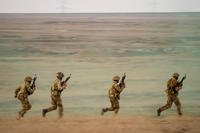On June 3, 1944, her 21st birthday, Maureen Flavin's reading of the gauges in the combination weather station, post office and lighthouse in Blacksod, Ireland, told her that a westerly storm was building over the Atlantic and would likely make a mess of the English Channel on June 5, 1944.
Unknown to Flavin, who would later marry the lighthouse keeper and become Maureen Sweeney, her weather readings as sub-postmistress in Blacksod went to a central office in Dublin and from there to London and the Supreme Headquarters Allied Expeditionary Force, or SHAEF, commanded by Gen. Dwight D. Eisenhower.
Sweeney's weather dispatch from the lighthouse was a crucial warning to Eisenhower, convincing him to change the date of the D-Day invasion and potentially saving the Allies' war effort in Europe. She passed away at age 100 on Dec. 17 at a nursing home in County Kerry, Ireland, where she was born.
Read Next: Marines Whose Cars Were Sold by Towing Company Will Be Repaid Under Court Settlement
Ireland was a neutral nation during World War II, but the government of Éamon de Valera had agreed to share weather information with the Allies. The information from Sweeney in County Mayo, the first spotting of the storm, touched off a near-panic at SHAEF.
Frantic messages came back to Blacksod on Ireland's West Coast saying "please check … please repeat," Sweeney would later recall in an interview with RTE, the Irish public broadcaster.
There was a follow-up phone call from "a lady with a distinct British accent" who asked her again to "please check, please repeat." She said, "We began to look at the figures again. We checked and rechecked."
Sweeney's forecast was given top priority and reached Group Capt. James Stagg of the Royal Air Force, who was Eisenhower's chief weather officer. More than 180,000 Allied troops, 11,000 aircraft and 7,000 ships and landing craft were assembled in England for an invasion of Normandy that Eisenhower had planned for June 5.
Stagg shared Sweeney's belief that a storm would hit the English Channel on June 5 but told Eisenhower that there would be a "window" over the Channel on June 6 that would allow the D-Day landings to proceed.
In her RTE interview, Sweeney said that "the invasion would have been a complete disaster" if Eisenhower had given the "go" signal on June 5, and historians have agreed with her assessment. "There they were with thousands of aircraft, and they couldn't tolerate low cloud," she said.
Sweeney was hailed in the Irish newspapers as an example of the little-known figure whose simple performance of duty can have historic consequences.
"Irishwoman Whose Weather Forecast Changed D-Day Landing Date Dies Aged 100," said the headline in the Irish Times. The Irish Mirror headline called Sweeney the "Mayo Woman Who Changed Course of World War II."
In June 2021, Sweeney was honored with a citation from the U.S. House of Representatives that was presented in a ceremony at her nursing home, the Irish Times reported.
Rep. Jack Bergman, R-Mich., who sponsored the citation but was not at the ceremony, wrote on June 6, 2021, the 77th anniversary of the D-Day landings, that Sweeney's "skill and professionalism were crucial in ensuring Allied victory, and her legacy will live on for generations to come."
In his address at the ceremony, Vincent Sweeney, Maureen Sweeney's son and now the lighthouse keeper at Blacksod Point, said of his mother that he was "happy that she got it right" in the forecast that warned Eisenhower off launching the invasion on June 5.
"The main thing was that she got the forecast right," the D-Day landings went ahead on June 6, and the Nazis were defeated. "We could be wearing jackboots, if you like," if his mother had gotten the forecast wrong, Vincent Sweeney said.














